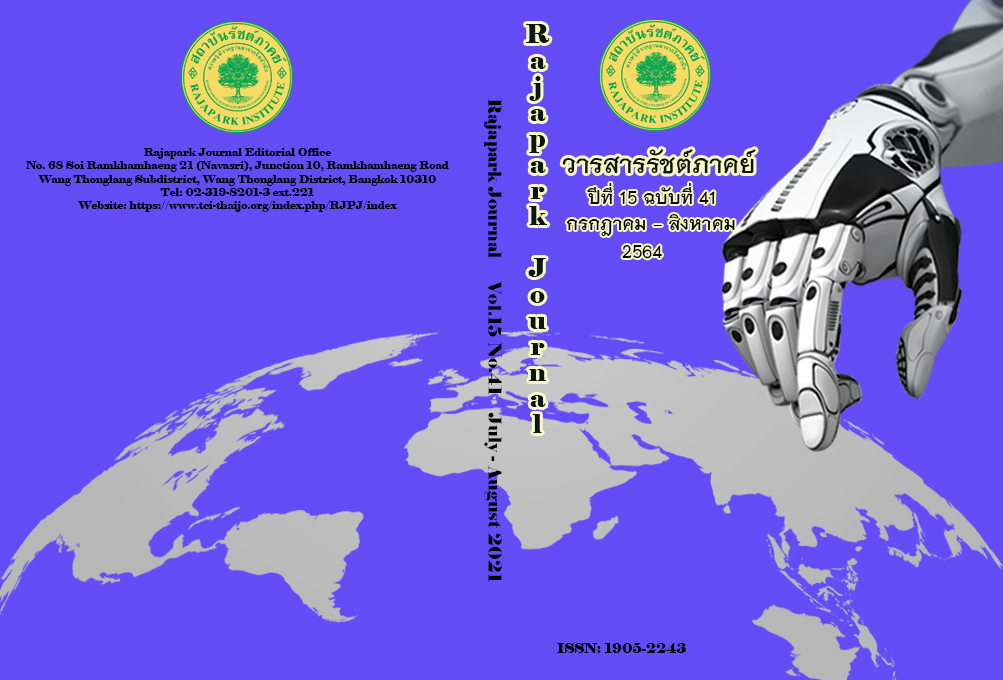Legal Measures for the Control Contamination of Heavy Metals In Groundwater from Factory Operations
Main Article Content
Abstract
Groundwater is naturally clean and pure. When groundwater is contaminated by various activities, it may lead to problems of degradation of groundwater quality. The legal measures to control contamination of heavy metals from factory operations in groundwater has an objective to study the problems of enforcing the factory act to control groundwater pollution from factories by comparing with the law of Japan, using a qualitative study model, documentary research, and comparative analysis of information from Thai and foreign language documents. The results of the research were found that the laws of Thailand could divide the preventive measures into two areas: setting groundwater quality standards and remediation funds. As for groundwater pollution control measures, it is about the exercise of the administrative power of officers. The said concept is also in the Japanese law; but Japan's law on setting groundwater standards is stricter than that of Thailand. The laws at the statutory level of Thailand are sufficient to address the problem of heavy metal contamination from factory operations in groundwater. However, some issues should be revised in the Factory Act B.E. 2535 and the relevant secondary laws. This is to make the contamination of heavy metals from factories in groundwater to be resolved effectively and sustainably.
Article Details
Views and opinions appearing in the Journal it is the responsibility of the author of the article, and does not constitute the view and responsibility of the editorial team.
References
Buapan, C. (1995). Groundwater. Bangkok: Odeon Store.
Chanoknamchai, M. (1997). Enforcement Measures of the Administration in Thai Legal System. Master of Law. Thammasat University.
Maharvechasiri, Y. (2014). Legal Measures for Management of Soil Pollution in Factory Site. Master of Laws. Thammasat University.
Manager Newspaper Online. (2020). JCBB Business. Retrieved April 1, 2021, from https://mgronline.com/local/detail/9580000058363
Ministry of the Environment Government of Japan. (2020a). National Effluent Standards. Retrieved January 25, 2021, from http://www.env.go.jp/en/water/wq/nes.html
Ministry of the Environment Government of Japan. (2020b). Water Pollution Prevention Act, 1970. Retrieved January 25, 2021, from https://www.env.go.jp/en/laws/water/wlaw/index.html
Ministry of Commerce. (2021). Organization information. Retrieved April 14, 2021, from https://datawarehouse.dbd.go.th/company/profile/5/0105544115817
Ministry of Industry. (2011). Soil and Groundwater Inspection for staff. Retrieved April 14, 2021, from http://www.ih-consultant.com/images/law/
Ministry of Industry. (2016). Ministerial Regulation to Control Contamination of Soil and Ground Water in Factory Area, B.E. 2559. Retrieved April 14, 2021, from http://www.ratchakitcha.soc.go.th/DATA/PDF/2559/A/038/89.PDF
Ministry of Natural Resources and Environment. (2000). Announcement of the National Environment Board No. 20 (B.E. 2543) Subject: Ground Water Quality Standards. Retrieved April 14, 2021, from file:///C:/Users/HP/Downloads/pcdnew-2020-05-19_03-03-53_056507.pdf
Plengsaeng, B. (2008). Legal Measures for the Control of Water Pollution from Industrial Factory. Master of Laws. Thammasat University.
Saichan, K. (1993). Japan and Environmental Management. Japanese Studies Journal, 10(3), 1-22. https://so02.tci-thaijo.org/index.php/japanese/article/view/52188/43266
Toprayoon, N. (2007). To Study on Opportunity and Necessity of Legal Aid Fund for Industrial Victims: Political Economy Analysis. Master of Economics. Chulalongkorn University.


